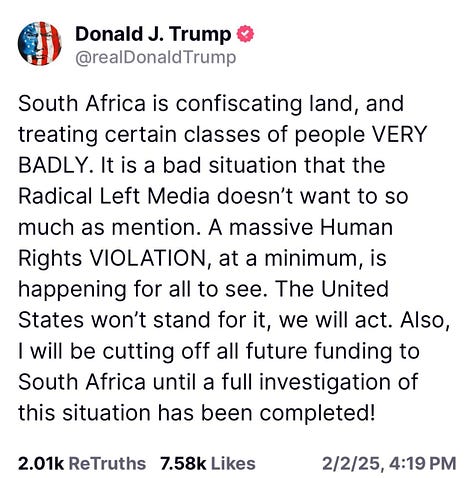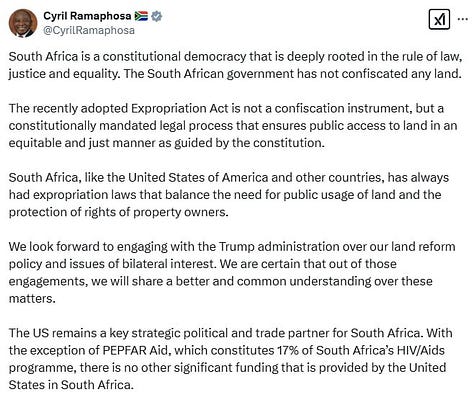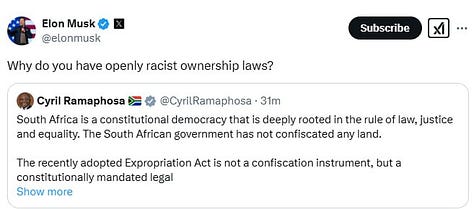The recent exchange between Donald Trump and Cyril Ramaphosa over South Africa's new Expropriation Act has exposed more than just international tensions - it has revealed the sophisticated machinery of narrative control that protects discriminatory policies from legitimate criticism.
When Trump called out South Africa's land confiscation and its treatment of "certain classes of people," he forced mainstream media to acknowledge what they've long ignored. More significantly, Elon Musk's direct question to Ramaphosa about "openly racist ownership laws" brought unprecedented visibility to an issue usually confined to alternative media.



The establishment's response has been telling. Rather than address the substance of these criticisms, South African state media (SABC) deployed what I call a "guilt by association reversal" strategy. Their U.S. correspondent framed Trump's intervention not as a legitimate concern about human rights violations, but as merely another example of Trump's supposed pattern of attacking other nations. "Look," they essentially said, "we're in good company with Canada and Mexico - other targets of Trump's criticism."
This deflection tactic is revealing. By making the story about Trump rather than their own discriminatory policies, they avoid having to defend the indefensible. They transform valid concerns about systematic discrimination into a referendum on Trump himself. It's a calculated bet that the Western liberal establishment's antipathy toward Trump will override any genuine concern for minority rights in South Africa.
The parallels with Zimbabwe's early stages of land seizure are impossible to ignore. There too, international warnings were dismissed through similar rhetorical tactics. Critics were painted as defenders of colonial privilege, while the systematic dismantling of property rights was dressed up in the language of "justice" and "equity." We all know how that story ended.
But there's a crucial difference this time. Having both Trump and Musk weigh in changes the game entirely. When Musk - whose cultural influence far exceeds even his considerable wealth - directly challenges Ramaphosa about racist ownership laws, it pierces through the carefully constructed narrative of 'equitable land reform.' Here is someone whose voice can't be easily dismissed or ignored, asking the uncomfortable questions that mainstream media has long avoided.
What's particularly striking about SABC's deflection strategy is how it reveals the establishment's inability to defend these policies on their merits. If the Expropriation Act truly represented justice and equality, why not engage with the substance of the criticism? Why resort to elaborate whataboutism involving Canada and Mexico?
The answer, of course, is that they can't defend the indefensible. Just as Zimbabwe's apologists couldn't justify Mugabe's policies on their merits, South Africa's establishment media must rely on misdirection and character assassination to shield discriminatory policies from scrutiny.
While the establishment media may try to bury the substance of these criticisms under an avalanche of Trump-related commentary, the very fact that this conversation is happening on a global stage makes it harder to maintain the pretense that all is well in the "Rainbow Nation."
For those of us who have long warned about South Africa's trajectory, this international attention provides a crucial opportunity to present the facts to a global audience. The question now is whether the West will learn from Zimbabwe's example, or whether we'll watch history repeat itself while arguing about Trump's Twitter habits.
Until next time,
Jonas Nilsson
PS: If you find value in my work, consider sharing it or becoming a paid subscriber. Those who do both have my gratitude - you make independent journalism possible.




Rhamposa's response is pretty adequate. It was probably written by a jew on Madison Avenue. What Rhamposa is saying is 'Our anti-White republic has an anti-White constitution, so we can legally engage in anti-White confiscation.'
Since neither Trump nor Musk mention White people *specifically* Rhamposa's PR flacks were given a huge bolt-hole through which to escape.
Trying to make the problem about generic 'racism' is a feature of Trump's jew-controlled politics: the word 'White' must never pass his lips.
Trump's anti-White politics is why I didn't vote for him in 2024.